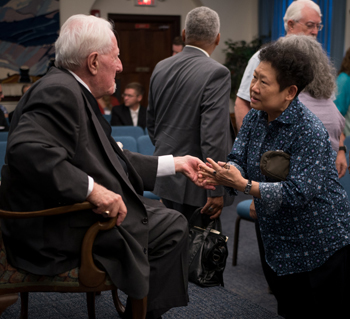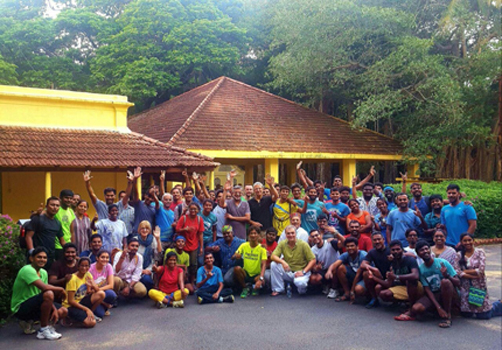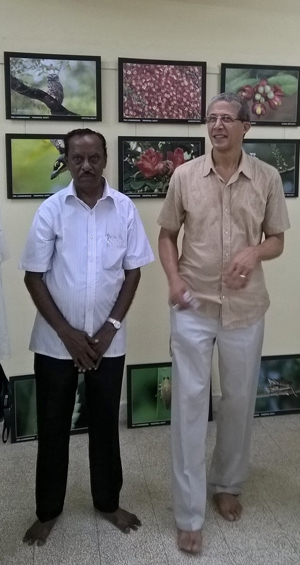The First Aspect of Realization: Who We Really Are
Printed in the Spring 2017 issue of Quest magazine.
Citation: Chowang, Orgyen, "The First Aspect of Realization: Who We Really Are" Quest 105.2 (Spring 2017): pg. 25-29
By Orgyen Chowang
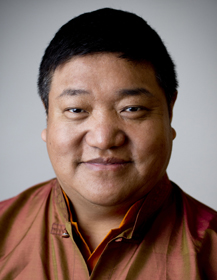 So far, we have explained how our mental events, discontent, negative emotions, distorted perceptions and ego result from our losing touch with our Pristine Mind. We talked about how our ordinary mind developed from our primordial fear. Now we can discuss the solution to all these problems—uncovering, or realizing, our Pristine Mind. By rediscovering our Pristine Mind, we can know who we really are, without mental distortions, with a healthy sense of self. So now we can begin the treatment for the discontent, the negative thoughts, and the misperceptions of our ordinary mind.
So far, we have explained how our mental events, discontent, negative emotions, distorted perceptions and ego result from our losing touch with our Pristine Mind. We talked about how our ordinary mind developed from our primordial fear. Now we can discuss the solution to all these problems—uncovering, or realizing, our Pristine Mind. By rediscovering our Pristine Mind, we can know who we really are, without mental distortions, with a healthy sense of self. So now we can begin the treatment for the discontent, the negative thoughts, and the misperceptions of our ordinary mind.
Calming the Mind
On a cloudy day, when all we can see are clouds, we cannot see the blue sky because the clouds obscure our view. Yet the luminous, beautiful, and boundless sky is always there.
As we have described, in the same way, if our mind is busy, chaotic, confused, or agitated, we cannot see our natural state of mind. Under these circumstances, we don’t realize that behind these thoughts and other mental events, our mind is calm, beautiful, boundless, and fearless. We do not realize that this is who we really are.
Mental events are like the clouds in the sky. If our mind is constantly churning with mental events—thoughts and emotions, beliefs, and habits—it is impossible to experience the mind’s natural pristine state. For that, our mind must be calm and our view of the mind must be uncluttered by transitory, but insistent mental events.
Even if we appreciate the importance of calming the mind, however, we will not be able to do that unless we know how to meditate properly. When our mind is cloudy, we cannot access Pristine Mind. But when our mind is clear, with the help of meditation we have the opportunity to realize who we really are. With that realization our life changes in a way that we never imagined possible.
You may be skeptical about this claim at first. Many people have a hard time even believing in the possibility of such a thing as Pristine Mind. Instead, they think that all there is, is the mind they know already, their ordinary mind. The reason for this is simple: they have never meditated, or they have not meditated properly, so they don’t have any other way of understanding their mind. But when they start Pristine Mind meditation, their ordinary thoughts subside and Pristine Mind appears—and then confidence in the reality of Pristine Mind is born.
So our first step is to learn the proper way to meditate. We have to know the appropriate technique, and we need to apply it properly to calm our thoughts and experience our mind in its pristine condition. Our attention is always directed to the external world. Now is the time to look within. Only then can we begin to realize the true nature of our mind.
Guru Rinpoche Padmasambhava says:
If you want to go sightseeing, try touring your own clear, mirrorlike mind instead.
The Runway to Pristine Mind
What technique can we use to effectively start our journey to realizing our natural, pristine state?
The clearest instructions for doing this come from Guru Rinpoche Padmasambhava, the main architect of the Pristine Mind teachings. Guru Rinpoche has given us the essential opening instructions for practicing Pristine Mind meditation in four steps:
Don’t follow the past.
Don’t anticipate the future.
Remain in the present moment.
Leave your mind alone.
We must understand these instructions. They are designed to help us stay in the present moment. Some other forms of meditation teachings say that remaining in the present moment is the ultimate objective of meditation. However, the present moment itself is not ultimate reality, ultimate truth, or the ultimate goal of Pristine Mind meditation. Nor is it what I mean when I refer to our fundamental nature. Instead, being in the present moment, with our mind calm and relaxed, simply creates the right conditions to begin to connect with our Pristine Mind.
We can think of abiding in the present moment as the “runway” to Pristine Mind. To fly an airplane into the sky, we need to take off from a runway. The present moment is the runway from which we take off to enter into our natural state of mind. But it is important to understand that remaining in the present moment just by itself is no more like being in Pristine Mind than sitting on the runway is like flying.
When I first began to travel by plane, it was very unfamiliar. I had never been on an airplane before. The plane needed to accelerate to a certain speed on the runway before it could take off. Then it would begin to rise into the sky. This was a new experience for me. I felt a little bit anxious and uncomfortable, especially during those first few minutes after takeoff when there is often a little turbulence. It felt very unnatural and strange to me. No one could move around or use their electronic devices. Everyone needed to keep their seat belt on.
After a while, however, when the plane arrived at its cruising altitude, people took off their seat belts and moved about. The flight attendants began to serve refreshments, and we discovered that we could then relax and enjoy the flight.
It is like this when we meditate. For someone who has never meditated before, who has never rested their mind, it can be a similarly unnatural experience. We may initially feel anxious or claustrophobic. We have a restless energy that makes it hard to remain in the present moment.
When we first start to meditate, the mind is pulled back by the heavy weight and number of thoughts and emotions that fill our mind and preoccupy us. There is significant agitation while the mind continues to be caught up in these mental events.
Initially, we go through all sorts of turbulence that makes it hard to remain present. We cannot rest our mind, because we have to go through that turbulence for a few minutes, just like on an airplane. As with the plane taking off, however, if we try to remain present, there is turbulence only for the first five to ten minutes. In time, our internal experience changes. Our initial agitation subsides, we relax, and we abide in our increasingly comfortable and more natural state. We gradually remain more and more in the present as the mind calms down. Eventually, we arrive at our internal cruising altitude, and we, too, can “relax and enjoy the flight.”
This is the difficulty many people feel when they first meditate. They often feel quite discouraged. However, this kind of initial experience is absolutely normal and does not mean that we are failing at meditation. Nor does it mean we are not benefiting from what we are doing. If we keep practicing, soon we will find that the turbulence passes, just as it does on the airplane, until we reach our more comfortable cruising altitude.
Guided Meditation: The Realization of Pristine Mind
Let’s go through a guided exercise showing how to actually start meditating.
Preparation. To prepare to follow the four steps given by Guru Rinpoche Padmasambhava, begin by relaxing your body, speech, and mind.
To relax your body, sit somewhere comfortable, such as on a chair or a cushion on the floor. Make sure your body is comfortable and at ease, not tense or awkward. You don’t have to try to maintain an unfamiliar, stiff position.
Next, relax your speech by allowing yourself to be quiet. Just relax into silence. Breathe naturally. Don’t force, control, or regulate your breathing.
Next, relax your mind. This is the most important part of this preparation. Your mind must be relaxed and present. This does not mean it should be passive and dull. Instead, it should be aware and alert. Keep your eyes open. Don’t shut out what you see, hear, or think, but don’t pay attention to those things either; just be natural in your keen awareness of your mind. In Pristine Mind meditation there’s no need to shut anything out. This gets easier as it gets familiar, like learning to ride a bicycle.
Step one. The first step, after this initial preparation, is don’t follow the past. Do not get caught up in thoughts, memories, or images of your past, regardless of whether they occurred minutes ago or years ago. Bring your mind fully into this present moment. Focusing on and following past events empowers the thoughts and emotions that disturb us. By not focusing on the past, we can quickly dissolve many of these disruptive thoughts. They slowly disappear from our perception.
Our mind has many outer layers of such thoughts, emotions, and other mental events that obscure our Pristine Mind. If we are going to fully realize the truth of our fundamental nature, we must stop following thoughts of the past. If we follow them, we are simply creating more mental events that lead us further away from realization of our Pristine Mind. Paying no attention to our mental events and not creating new ones is the first step in dismantling the layers of mental events that cover our Pristine Mind.
Step two. The second step is don’t anticipate the future. Remind yourself that now is not the time to pursue, plan, or follow any thoughts, feelings, or imaginings of the future. Do not begin wondering or speculating about what will happen. That is just another way to invite mental events. Instead, just stay alert in the present.
At this moment, then, while you are meditating, your mind is neither in the past nor in the future. It is not held hostage by mental events based on memories of the past or projections of the future. That means the mind is clearer and calmer. You have dismantled more and more of those layers of mental events that block your Pristine Mind, and, as a result, more of your Pristine Mind is slowly exposed to your view and realization.
Step three. When you are not in the past and not in the future, then the next step is stay in the present moment. Just be present. There is nothing to do but vibrantly experience your mind. The question is not what to do. Your mind is just being natural and aware. Just let your mind be natural in this way. Just as water is just water, and blue sky is just blue sky, your mind is just what it is, remaining in the present moment.
It is important to note here, however, that being in the present itself is not a passive and lifeless process. It is not simply “spacing out.” That will do little good. Instead, it is an active and dynamic process, not unlike the airplane going down the runway and taking off. In the beginning it requires some effort. As you move into your meditative cruising altitude, it is more tranquil, but still vibrant.
Apart from this, you do not need to do anything but be who you are.
Water does not have to try to be water. It does not have to try to be calm, clear, and liquid. Water is innately still, clear, and calm. That is what water is. The blue sky does not have to do anything but just be the blue sky. The sky does not panic when the clouds are gone; it just remains the blue sky. Similarly, when thoughts and emotions subside, you do not need to panic. You do not need to wonder what you should do. You just need to allow your mind to be what it naturally is. Simply experience your awareness. Observe only the clarity of your mind. Nothing else is necessary.
Step four. Finally, Guru Rinpoche Padmasambhava says, leave your mind alone.
You don’t have to expend effort pushing thoughts of the past or future out of your mind in order to remain in the present. You don’t have to drive thoughts out of your mind and grasp at the present moment. Instead, just let all those thoughts melt away, leave your mind alone, and the present moment will be there for you. You will gradually feel a lightening up. Your thoughts will fall away, as if you are rising into air. Your thoughts will settle like sand in a glass of water.
If you meditate properly and are able to leave your mind alone, all ordinary thoughts will subside because your mental events cannot survive without your attention on them. How can they survive? Your current thoughts and emotions originated from your attention to the past and the future. Now that you are no longer paying attention to the past or the future, the thoughts and emotions naturally dissolve.
We know that clouds cannot exist without the presence of certain circumstances. If no such necessary conditions are present, then clouds cannot continue to exist. They just vanish. They are gone. Similarly, if there are no supportive conditions for thoughts or emotions, then they, too, just vanish. When clouds dissolve or disappear, only blue sky is left.
The spacious blue sky of our mind has always been present, but it has not been visible, because there are so many clouds of mental events obscuring it. As mental events dissolve, our Pristine Mind naturally emerges. This is our fundamental nature. This is the ultimate reality. This is the true nature of our mind.
When we experience Pristine Mind, we are more ourselves, our mind is more natural, and that state is less obscured and less disrupted by mental events that cloud our view. When we are in that condition, we see our naked mind without the clothing of mental events.
In facilitating that increasingly clear view of our mind, this meditation leads us to “realization”—a realization of what our mind truly is and who we really are.
Once thoughts and emotions subside, we are left with the experience of Pristine Mind. You need to experience it for yourself. And this meditation is the way to accomplish that.
When you have meditated for a while, you can check for yourself. Is your experience more pristine, calm, and clear? Does it feel boundless? Is it “flawless awareness”? Is it free from distortions? Is it an untainted state?
Experiencing your mind directly in such a way is experiencing your fundamental nature. Everything that you need to understand is explained clearly right there in that experience.
If you understand and know who you are in this state, then you will experience the most amazing and beautiful thing.
The mind is like a blue sky, fundamentally; eventually you will discover that.
The mind is flawless; eventually you will experience that.
The mind is pristine, pure; eventually you will directly enter that.
oThis is the most wonderful thing that will ever happen in your life.
You realize or recognize your true state of mind, your normal, natural, unfabricated state of mind. Perceiving or experiencing your true nature is called realization. The more you meditate, the more this experience will unfold. As Guru Rinpoche Padmasambhava says:
The mind’s own awareness is naturally brilliant, like the sun.
To see for yourself if this is true, look into your own mind.
Your pristine awareness is continuous, like a river.
To see for yourself if this is true, look into your own mind.
The various events of mind cannot be found, like wind in space.
To see for yourself if this is true, look into your own mind.
Whatever you perceive is your own projection, like your reflection in a mirror.
To see for yourself if this is true, look into your own mind.
Your thoughts naturally occur and naturally dissipate, like clouds in the sky.
To see for yourself if this is true, look into your own mind.
This is just the beginning, but it is very, very important. The entire path to full awakening, or enlightenment, starts here.
When we stay in Pristine Mind meditation for twenty to thirty minutes, or longer, we are on the path to experiencing that fundamental mind, not the ordinary mind full of mental events. We are coming face to face with the fundamental, natural state of mind that is otherwise obscured by the mental events that usually preoccupy us and consume all of our attention. We must not just understand this intellectually, but we must actually perceive that pristine state and experience this state of flawless awareness for ourselves, face to face.
As we attain this realization, we see our awareness without layers of distortion. We recognize, “My mind is innately flawless. I never saw that before.” It’s like seeing the sky without clouds and saying, “Oh, I see. The sky is blue.” It’s not an intellectual concept—it’s experiential. We have that kind of experience. We see that our mind is pristine.
This kind of realization in meditation is the key that opens the door to enlightenment. It all starts here.
Guru Rinpoche Padmasambhava says:
If you recognize your own innate pristine awareness,
You will surely attain enlightenment.
With our increasing understanding and steady practice of meditation, we will find that when our mind is cloudy or irritable, we can return to our calm, pristine state instead of following our mental events, and then all mental events will dissolve. With more and more experience, whenever we feel agitation, sadness, or stress, we can just return to this pristine state. Whenever we are anxious or afraid, we just return to this state.
When we come back to this state and we remain in pristine awareness, our negative experiences vanish. This pristine state becomes our normal experience. We can dissolve those uncomfortable experiences at any time. As our practice grows, this becomes our new normal experience. At any time, we can access Pristine Mind merely by relaxing ourselves—not following the past, not anticipating the future, staying in the present moment, and leaving our mind alone. Of course, when we are not in formal meditation, we need to deal with our everyday circumstances. But more and more, we will be able to maintain our awareness while doing so.
Reconnecting with our true state of mind is the most important, most precious, most valuable, and most liberating experience in the world. This recognition determines everything that is to come. Not knowing, realizing, or recognizing our true nature leaves us confused and at the mercy of our thoughts and emotions. Being aware of our own fundamental nature leads us to the happiness and liberation of enlightenment. If we want to free ourselves from the experiences of mental events, primordial fear, and ego, we take the most important step toward that freedom by experiencing the realization of Pristine Mind.
Guru Rinpoche Padmasambhava says:
How ironic that we have not recognized something that has
been with us for so long.
How ironic that even though it’s as clear and brilliant as the sun,
it is something so few people ever see.
How amazing that no matter how much happiness or suffering
we experience, our Pristine Mind never changes.
Realization is the recognition of our Pristine Mind. When we experience realization of our natural state of mind, that connection to our Pristine Mind is restored. With realization, ordinary thoughts and emotions diminish, our fear gradually dissolves, and our sense of self becomes healthier and more robust. Eventually we recognize that remaining in Pristine Mind is the essential solution to all of our problems in life.
All these improvements come from our realizing our Pristine Mind. From this first realization, the journey to liberation begins and the distortions of our ordinary mind lessen and lessen. What unfolds is the path to enlightenment.
It is important to understand, however, that our ordinary mind and the unhealthy ego that often controls it do not easily give up their power to dictate our thoughts and perceptions. As a result, some people may resist the very idea of realization because of their own beliefs or the belief systems or “conventional wisdom” that they have accepted as true. They may even make improbable claims based on their own thoughts, opinions, and beliefs, and try to convince others that what they believe is true for everyone. Established religious systems, for example, have their own belief systems. They often want their own views to be accepted as true by everyone.
Once you have experienced Pristine Mind, you do not have to blindly accept either your own current set of beliefs or others’ opinions and judgments about what is true or not true. Instead, you will see for yourself what is true. When your thoughts and emotions vanish, when you perceive the actual nature of your mind, then no one’s opinions, judgments, or views are involved. That direct perception is called realizing who you really are. It is realizing your own natural state of mind, the way your mind has always been.
In meditation, we are realizing the nature of our own true consciousness. When our thoughts and our belief systems subside and fall away, then we have access to the person we really are.
A question I am sometimes asked is, “How can we take care of our daily lives if we are focusing only on the present moment, and not on the past or the future?” During meditation, we don’t entertain these thoughts. Afterward, of course, we attend to the practical issues of life, which necessarily require planning for future contingencies and considering past events. When we cook, we cook; when we drive, we drive; and when we meditate, we meditate.
A beginning meditator may not experience Pristine Mind immediately. This is because a beginner may be unable to remain in the present moment and to leave the mind alone. These are the most important things to do when meditating: to remain in the present moment and to leave the mind alone. This takes practice. When you find your mind wandering into thoughts about the past or future, just bring your attention back to present awareness. The more you do this, the better you will get at it. Then your Pristine Mind will appear naturally.
Orgyen Chowang Rinpoche is a meditation master in the Nyingma lineage of the Buddhist tradition. His primary teacher was Jigme Phuntsok Rinpoche, a Dzogchen master from the twentieth century.
From Our Pristine Mind by Orgyen Chowang Rinpoche © 2016 by Orgyen Chowang. Reprinted by arrangement with Shambhala Publications, Inc., Boulder, Colorado. www.shambhala.com


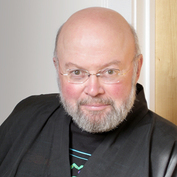 Science is the religion of our time. Much of what we assume of reality, our Weltanschauung, has been shaped by the general view that is embraced by most scientists today. Often called “realism,” it is a “substantialist” view. This scientific realism, according to physicist James Cushing, “requires roughly at a minimum that our scientific theories are to be taken as giving us literally true descriptions of the world.” Yet all conceptual thought—all theory, concept and belief—leads inevitably to contradictions. Indeed, some scientists themselves view scientific realism as suspect. Physicist Asher Peres, for example, reaches the conclusion that “any attempt to inject realism in physical theory is bound to lead to inconsistencies.”
Science is the religion of our time. Much of what we assume of reality, our Weltanschauung, has been shaped by the general view that is embraced by most scientists today. Often called “realism,” it is a “substantialist” view. This scientific realism, according to physicist James Cushing, “requires roughly at a minimum that our scientific theories are to be taken as giving us literally true descriptions of the world.” Yet all conceptual thought—all theory, concept and belief—leads inevitably to contradictions. Indeed, some scientists themselves view scientific realism as suspect. Physicist Asher Peres, for example, reaches the conclusion that “any attempt to inject realism in physical theory is bound to lead to inconsistencies.”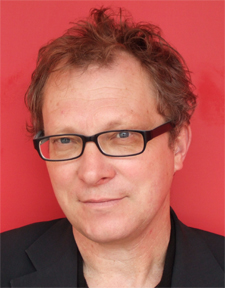 When people ask me what I write about, I have a few standard replies, but one answer that covers most of my work is “the evolution of consciousness.” Of course in most cases this only leads to more questions, the most common of which are “How can you say that consciousness is evolving?” or “Really? What evidence do you have for its evolution?” Or, as the title of this article has it, “If consciousness is evolving, why aren’t things getting better?”
When people ask me what I write about, I have a few standard replies, but one answer that covers most of my work is “the evolution of consciousness.” Of course in most cases this only leads to more questions, the most common of which are “How can you say that consciousness is evolving?” or “Really? What evidence do you have for its evolution?” Or, as the title of this article has it, “If consciousness is evolving, why aren’t things getting better?”